When the ac is on, the car may jump because the compressor places extra load on the engine. This extra load can cause the engine to hesitate or jerk.
If you’ve ever noticed that your car jumps or hesitates when you turn on the ac, you’re not alone. Many people experience this issue, and it can be quite annoying. The reason behind this is that when you turn on the ac, the compressor puts an extra load on the engine, which requires more power and can cause the engine to jerk or hesitate.
This can be particularly problematic if you’re trying to merge onto a busy freeway or accelerate quickly from a stoplight. In this article, we’ll explore some of the reasons why your car might be jumping when you have the ac on and what you can do to fix the issue.
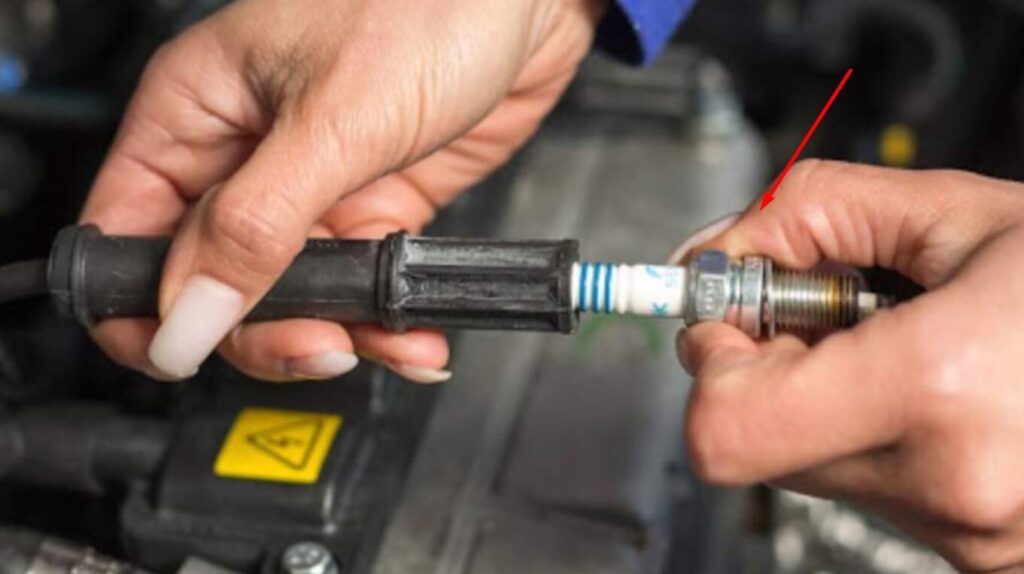
The Science Behind AC Systems
We all love to drive in a cool and comfortable car, especially on hot summer days. However, if you’ve ever noticed your car jumping or stalling when you turn on the ac, it can be quite frustrating and worrisome.
In this blog post, we’ll discuss the science behind ac systems in cars and why your car may jump when you’ve got the ac on.
Understanding The Purpose Of An AC System In A Car
Before we dive into how an ac system works, it’s important to understand its purpose. The primary purpose of an ac system in a car is to provide a comfortable driving experience by cooling the interior of the car.
It helps regulate the temperature inside the vehicle, preventing it from getting too hot or cold, and removing humidity to enhance air quality.
How An AC System Works?
An automotive ac system is a complicated network of components that work together to cool the car’s interior. Here’s a brief overview of how an ac system works:
- The compressor begins by compressing refrigerant gas, which creates heat and pressure.
- The hot gas then flows to the condenser where it is cooled by the air flowing through it. As the gas cools, it turns back into a liquid.
- The liquid then flows to the evaporator where it expands and turns back into a gas. As it expands, it absorbs heat from the air flowing over the evaporator, cooling the air inside the car.
- The cooled air then flows into the car through the vents.
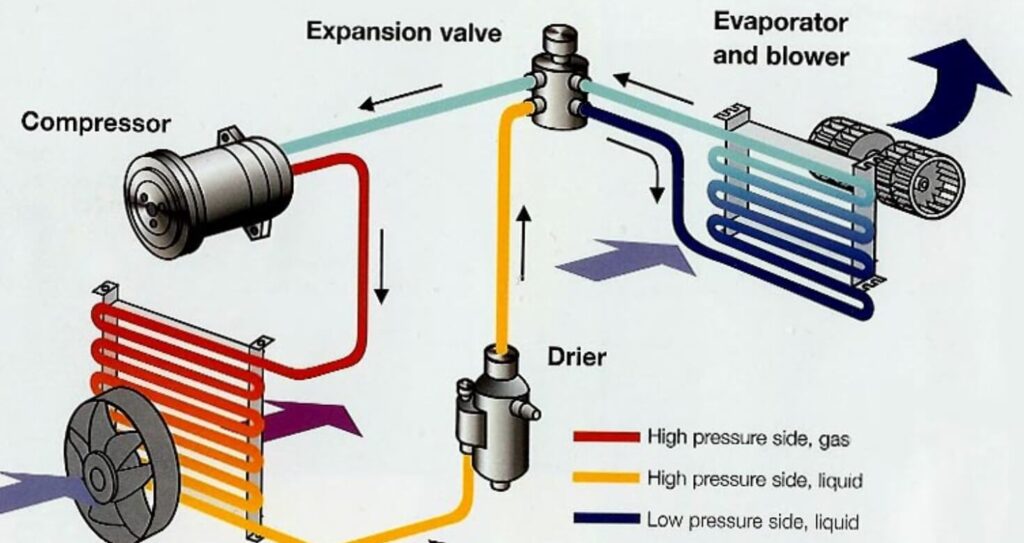
Effect Of AC On Engine And Other Car Systems
While an ac system provides comfort for car occupants, it can affect other car systems as well. Here are a few things you should know about the effect of ac on engine and other car systems:
- When you turn on the ac, your car’s engine has to work harder, which can cause it to use more fuel and emit more pollutants.
- The compressor responsible for compressing the refrigerant gas is powered by a belt that is connected to the engine. This puts additional strain on the engine and can cause it to jump or stall.
- The ac system draws power from the battery, causing it to drain faster. This can lead to a dead battery if you’re running the ac while the engine is off.
- In newer cars, the ac system is interconnected with other systems like the engine control module (ecm) and the transmission control module (tcm). When the ac system is malfunctioning, it can cause issues with these other systems, resulting in poor performance and decreased fuel efficiency.
Understanding the science behind ac systems can help you better maintain your car and troubleshoot any issues that may arise, such as jumping or stalling when you turn on the ac. Remember to prioritize regular maintenance, including inspections and air conditioning service, to avoid any unwanted surprises during summer road trips.
Stay cool, and happy driving!
Impact Of Low AC Refrigerant Level On Car’s Performance
How Low Refrigerant Level Affects An AC System?
The air conditioning (ac) system in a car uses refrigerant as the cooling agent. The ac compresses the refrigerant and then circulates it through the system, converting hot air from outside into cold air inside the car. As the refrigerant level drops, the ac system’s functionality is compromised, leading to its poor performance.
When the refrigerant level is low, the ac system struggles to absorb heat, resulting in warm air blowing inside the car. Here are some ways in which low refrigerant levels affect an ac system:
- The ac system fails to cool the air inside the car.
- The ac compressor has to work harder than usual, leading to extra wear and tear on the system.
- Low refrigerant levels can cause the ac compressor to shut down, eventually leading to ac system failure.
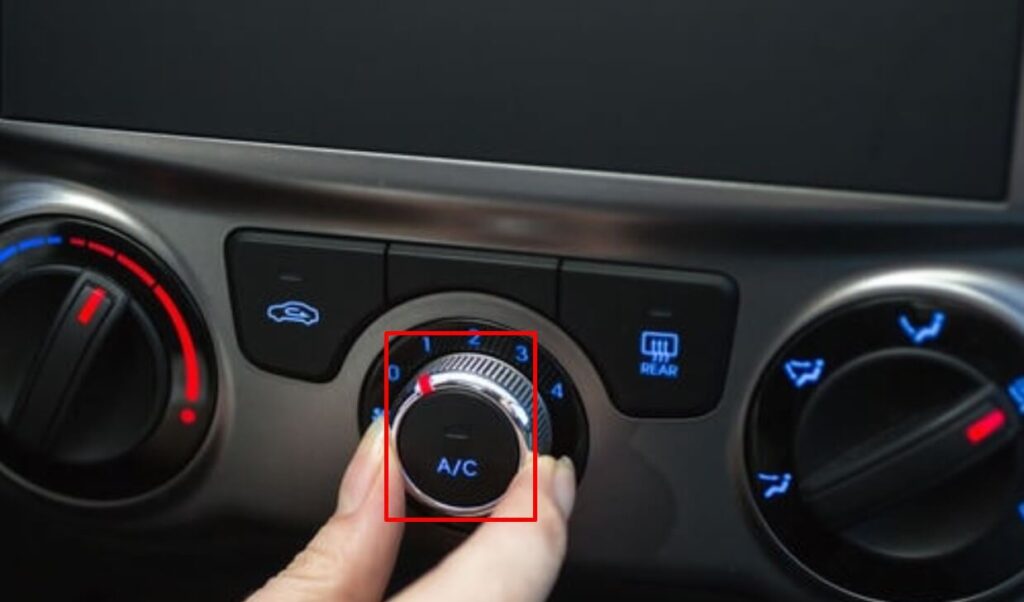
Signs That Your Car’s AC Refrigerant Level Needs Attention
Low refrigerant levels can cause multiple issues in the ac system. As a car owner, it’s important to be aware of warning signs indicating that the ac refrigerant level needs attention. Here are a few warning signs to look out for:
- The ac system is not cooling the air inside the car as it should.
- The ac system takes longer than usual to cool the air inside the car.
- There’s a hissing sound coming from the ac system, indicating refrigerant leakage.
- The ac system emits an unpleasant odor, caused by the accumulation of moisture in the ac system.
How Low Refrigerant Level Contributes To AC-Related Jumping?
Low refrigerant levels can cause the ac system to jump or vibrate while in operation. When the refrigerant level drops, there can be a decrease in the air conditioner’s cooling capacity or uneven cooling. A weak cooling system will cause the compressor to work harder to compensate for the shortage of refrigerant, creating a back and forth motion that leads to an ac system-related jump.
Therefore, it’s essential to maintain the refrigerant level in the ac system to prevent any major issues.
Low refrigerant levels can cause various issues in the car’s ac system, leading to poor performance, wear and tear, and even ac system failure. It’s important to keep an eye out for warning signs to prevent these issues from escalating.
By taking preventive measures such as regular check-ups and maintenance, you can keep your car’s ac system functioning correctly and ensure a comfortable driving experience.
AC Compressor Issues That Can Cause Car Jumping
Driving your car with the ac on is comfortable; however, it can be troublesome when your car starts jumping. You may be wondering what could be the cause of this engine vibration. Ac compressor problems could be the primary cause of the car jerking or jumping while driving with ac on.
Let’s have a closer look at some common ac compressor issues that can cause car jumping.
Common AC Compressor Problems That Can Cause Car Jumping
Several problems in the ac compressor system can cause the car to shake or jerk, which include:
- Compressor clutch: When the ac compressor clutch is not engaging properly, it can cause the car to jump.
- Low refrigerant level: A low level of refrigerant in the ac compressor system can cause overheating, making the ac compressor clutch to keep turning off and on, which creates an engine jerking.
- A failing ac compressor: An old and worn-out ac compressor can cause the car to jump while driving, especially when the ac system is turned on.
Signs Of A Faulty Compressor Or Related Issues
If your car feels like it’s jumping or vibrating while the ac is on, it’s a sign that there might be a problem with your compressor or related issues such as:
- Unusual noises: Strange noises could be a sign of a faulty ac compressor, such as grinding, squealing, or banging sounds.
- Lack of cool air: If your ac is blowing warm air, it’s a sign of a problem with the compressor.
- AC system turning on and off: The compressor should remain continuously engaged when the ac is on. If it is turning off and on, causing your engine to jerk, there might be a problem with the compressor clutch.
How To Fix AC Compressor Issues In A Car?
If your car is jumping or vibrating while driving with the ac on, then it’s time to fix your compressor or ac system. Here are some ways to solve the ac compressor issues:
- Check the refrigerant: If your car’s ac compressor is faulty, the first thing to do is to check your refrigerant levels. You can use a refrigerant gauge to check the refrigerant levels on your ac system.
- Replace the ac compressor: If your ac compressor is old or worn out, consider replacing it. A new compressor may solve the problem of excessive shaking or vibration.
- Fix the ac compressor clutch: A malfunctioning ac compressor clutch could be the reason behind the car jumping while the ac is on. In such cases, you can fix the compressor clutch or replace it to solve the problem.
If your car is jumping while driving with the ac on, it’s time to check your car’s ac compressor. The compressor clutch, low refrigerant levels, and a failing ac compressor are common issues that cause excessive engine vibration. Keep an eye out for unusual noises and lack of cool air as these can be other signs of a faulty compressor.
You can fix the compressor clutch, replace the ac compressor, or check the refrigerant levels to resolve the ac compressor problem.
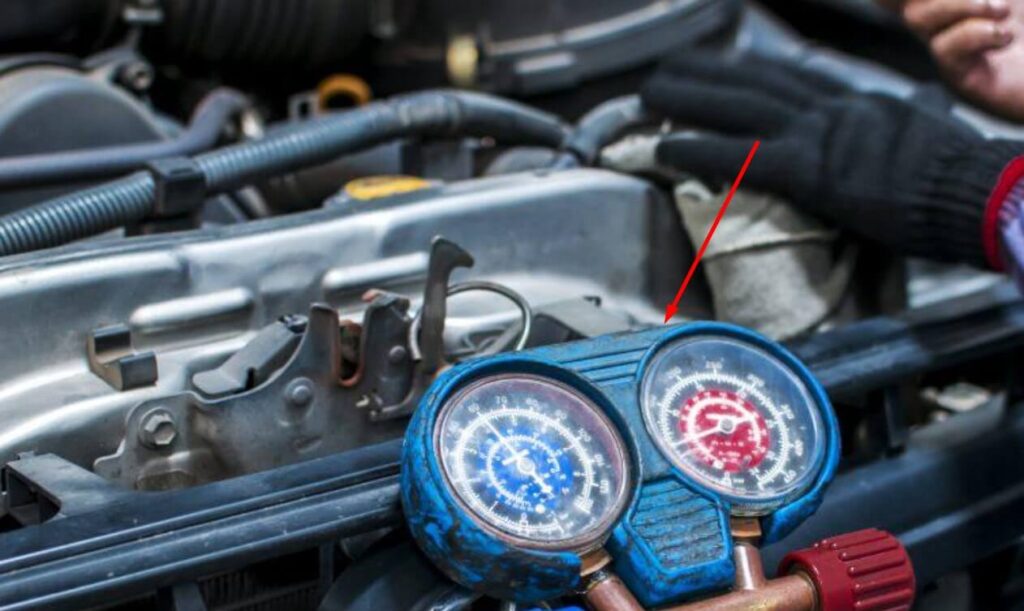
Electrical Issues And AC-Related Car Jumping
Understanding Electrical Issues Associated With AC Systems
Cars use various systems to power the different parts and components, including the ac system. When these systems experience electrical issues, it can result in the car jumping or jerking. There are several electrical issues that can affect the performance of your car’s ac system:
- Faulty wiring or connections: Damaged or disconnected wires can cause intermittent or complete ac failure.
- Dead or failing battery: A dead or failing battery can cause your car to jump when the ac is turned on.
- Malfunctioning ac clutch: If the ac compressor clutch is damaged or failing, it can cause your car to jerk when the ac is turned on.
How To Detect Electrical Issues In A Car?
To diagnose the electrical issues that are causing your car to jump when the AC is turned on, follow these steps:
- Check the battery: Make sure the battery is fully charged and functioning properly.
- Inspect the wiring: Check all the wiring and connections for damage or corrosion.
- Test the ac clutch: Check the ac compressor clutch for proper engagement and function.
- Consult a mechanic: If the above steps don’t rectify the issue, take your car to a certified mechanic for a complete diagnosis.
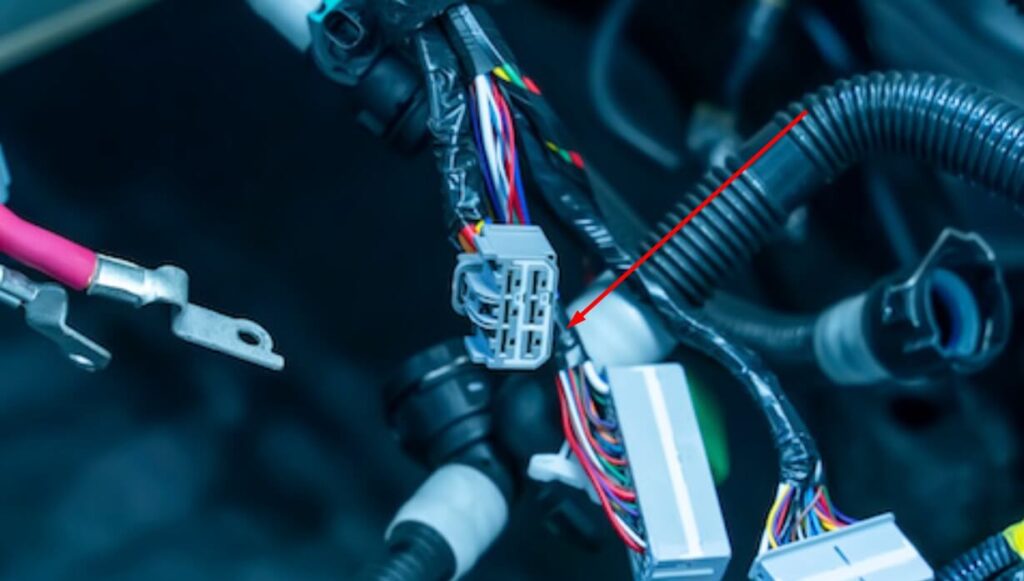
The Impact Of Electrical Issues On AC Systems And Car Performance
When your car experiences electrical issues, it can not only impact the ac system but also affect the car’s overall performance. Here are a few ways these issues can affect your car:
- Reduced fuel efficiency: Electrical issues can put a strain on your car’s electrical system, resulting in reduced fuel efficiency.
- Frequent ac failures: Continuing to use your car with electrical issues can cause the ac system to fail more frequently and for longer durations.
- Compromised engine performance: Electrical issues can also affect the engine’s performance causing damage to engine components and reducing engine output.
Electrical issues related to the ac system can cause your car to jump or jerk. These issues can include faulty wiring, a dead battery, or a malfunctioning ac clutch. You can detect these issues by inspecting the battery and wiring, testing the ac compressor clutch, and consulting a mechanic.
Moreover, electrical issues can impact the car’s overall performance and cause reduced fuel efficiency, frequent ac failures, and even damage to engine components. Make sure to have any electrical issues inspected and resolved by a certified mechanic to maintain your car’s optimum performance.
AC Belt And AC Clutch Problems
How The AC Belt And AC Clutch Work?
The ac system in your car has several significant parts, and two of them are the ac belt and ac clutch. They work hand in hand to produce cool air inside your car. Here’s how they work:
- AC belt: The ac belt is a rubber belt that connects the ac compressor to the engine’s crankshaft. When the ac button is turned on, the compressor is triggered, and the belt spins the compressor, circulating refrigerant throughout the system.
- AC clutch: The ac clutch is an electromechanical device that controls the compressor’s power. When the ac button is pressed, the electromagnet in the clutch attracts an armature and engages the clutch’s friction plates. This connection turns the ac compressor shaft, allowing refrigerant gas to flow through the system.
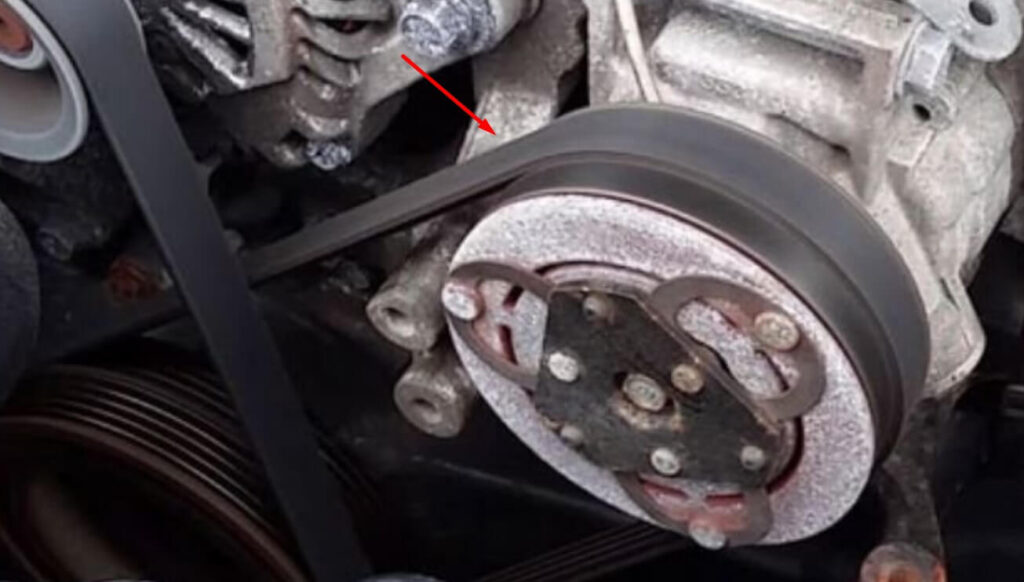
Common Problems Associated With These Components
Like any part of the car, issues with the ac belt and ac clutch are inevitable due to wear and tear. Here are some common problems associated with these components:
AC belt:
- Worn or stretched belt.
- Misaligned belt.
- Cracked or frayed belt.
- Over-tensioned or loose belt
AC clutch:
- Malfunctioning clutch coil.
- Worn or damaged clutch bearings.
- Electrical faults or wiring damage.
- Cracked or broken clutch plate
How To Tell If The Ac Belt Or AC Clutch Needs Attention?
It’s essential to keep an eye on your car’s ac system and be alert to any warning signs to prevent major problems or breakdowns. Here are some common indications that may suggest the ac belt or ac clutch needs attention:
AC belt:
- Squealing or chirping noise when turning on the ac.
- No cool air coming out of the vents.
- The ac system is slow to cool.
- A burning smell when the ac is turned on
AC clutch:
- The compressor doesn’t turn on when the ac is turned on.
- A clicking or grinding noise when the ac is turned on.
- The ac system produces cool air for a short time, then warm air.
- Significantly reduced fuel efficiency
Understanding your car’s ac components is vital in maintaining a comfortable and safe ride. Regular check-ups and proper maintenance can prevent major problems, prolong the longevity of your car, and save you money in the long run.
Frequently Asked Questions For Why Does My Car Jump When I Have The AC On
Why Does My Car Jump When I Turn On The AC?
When you turn on the ac, it puts an extra load on the engine, making it work harder. This, in turn, can cause your car to jump or shudder as energy is diverted from other systems to power the ac compressor.
Is It Normal For A Car To Jerk When The AC Is On?
It’s not entirely abnormal for a car to jerk or shudder when the ac is on. However, if the problem is severe, it may indicate a more serious issue with the engine or ac system, such as a damaged compressor or vacuum leak.
How Can I Fix The Jerking When My AC Is On?
If you’re experiencing severe jerking or shuddering when your ac is on, it’s best to have a professional mechanic diagnose and fix the problem. Common solutions include replacing faulty ac parts, cleaning the throttle body, and performing a fuel system cleaning.
Can A Bad Battery Cause My Car To Jump When The AC Is On?
A bad battery can certainly cause your car to jump when the ac is on, especially if it’s low on charge. This is because the ac puts added strain on the battery, and a low charge can cause the battery to struggle with the extra load.
Do All Cars Experience Jerking When The AC Is On?
No, not all cars experience jerking when the ac is on. However, some cars may have underlying issues that exacerbate the problem, such as a malfunctioning ac compressor or poor engine performance. It’s best to have your car inspected by a professional if you’re experiencing severe jerking or shuddering.
Conclusion
To summarize, a car jumping with the ac on can be caused by a variety of factors such as a malfunctioning compressor clutch, worn-out spark plugs, or dirty fuel injectors. Ignoring this issue can lead to more severe damage and expensive repairs in the future.
However, you can take some preventive measures like regularly servicing your car, keeping the windows down to provide better ventilation, or getting the ac compressor checked if it’s cycling too frequently. Remember, regular car maintenance can prevent not only jumping with the ac on, but also a range of other problems that can arise later.
By following these simple tips, you can help keep your car running smoothly and cool during the hot summer months.
